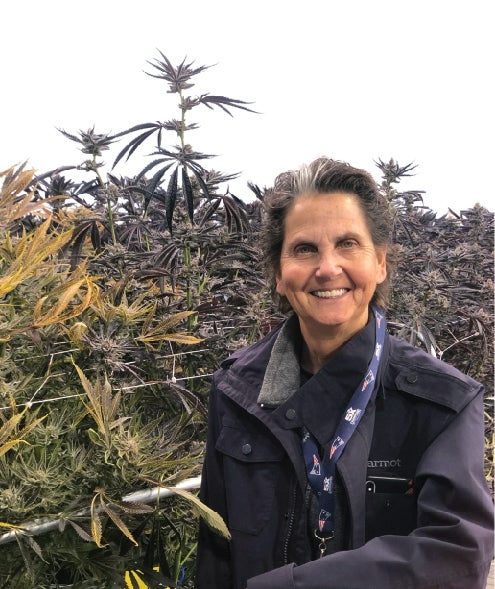The Commonwealth Cannabis Company in Millis, a woman- and family-owned operation known by the abbreviation CommCan, is preparing to triple its manufacturing capacity and hire 50 new employees. The expansion comes as recreational cannabis companies in Massachusetts are just turning their lights back on following a two-month shutdown due to the coronavirus pandemic. Ellen Rosenfeld, who owns the company with her two brothers, spoke to WBJ about what it’s like to expand during a recession and why it’s important to have women, like herself, in leadership positions.
How has it been running a cannabis business during a tumultuous first half of the year, both economically and socially?
It’s been tumultuous since we started this thing six years ago. Massachusetts is a very difficult, regulated environment. Probably the worst of all the cannabis states. So every day is a new experience.
If you can’t pivot in this business, you’re not going to make it in this business. So, it started with the vape ban last September. That was the first big out of the blue event. I lost 40% of my business. Most everybody lost 30-40% of their business. It has never recovered by the way. People are afraid. They never really resolved it.
Then, of course, this spring. Now, we just opened in November for our co-located shop. We got in a little bit of a rhythm going before we got shut down. So, what did we do? I handed out a million pieces of paper to all of our customers on how to get a medical card. That was the first thing I did. And they did. Through the shutdown, so many people got their medical cards, our business went up probably tenfold in the medical program.
What separates CommCan from other cannabis businesses in Massachusetts?
First of all, we’re here. I’m sitting in my office right now, which is three minutes from the dispensary and three and a half minutes from cultivation, so I’m there all the time. My brother, Marc, who really runs the business, his office is in the cultivation facility. So, that’s number one.
Number two, we’re developers. We’re business people. We know how to run a business. We run a successful construction company, a developing company. Our whole lives are business. You have no idea how many people get into this and they have no idea how to run a business. You’ve got the money people, and you’ve got the product people. Neither one of them know how to run a business. All of the competition, really, there are very few of them are committed to the business – making a good product and making money.
When you started CommCan, why was it important to you that the business operate locally?
We were born in this town, which is the neighboring town of Medway. We developed in these towns our whole lives. We have relationships with these towns. In the middle of this shutdown, I had a host community payment due to the town of Medway. Right at the beginning of the shutdown, and I’m freaking out because the medical money hadn’t really started to uptick yet, and I sent an email to the town manager who I love, who i’ve had a relationship with for many years, and I told him, “I need more time.” And that’s all it took.
I don’t think a lot of these groups have the support of some of the communities they are in. I certainly know they don’t have the kind of support I do, and that’s huge. Huge.
I understand you will be tripling your manufacturing capacity and adding to your workforce in the coming months. Why is this the right time to expand, and what will it mean for CommCan?
I still have limits in my dispensaries, particularly on flower. Everyone has limits, nobody is making enough. Nobody’s making enough in Massachusetts. There’s a shortage [of flower] in Massachusetts. Nobody in Massachusetts has the capabilities that they want. The licensing, what you have to go through in Mass., is so difficult that you’re lucky you got anything. We need to expand just for our existing facilities, and I have a facility in the pipeline. I need to ramp up, and I need to take the limits of my existing [operation]; and I want to wholesale. I want to get our brand out there.
Diversity in business is important for many reasons, both operationally and ethically. As a woman-owned enterprise, why do you think it’s important to make sure women and other groups are represented in the state’s cannabis industry, specifically?
First of all, I think it’s important, and I would go on record saying this: I think women are smarter than men. I have always felt women were smarter than men. Now, I don’t know if it’s because women are smarter than men or if they articulate better, because men, they don’t speak as well, they don’t get across as well, what they mean, as women.
Women are more straightforward, if you let them talk, of course. They’re smarter. They get to it. Women are do-ers. Men, they want to find somebody to do it. They have an idea, but they don’t want to do it. But women, you don’t have to ask them six times “Have you done this?” The minute they have an idea, they do it. They implement. I don’t know if that goes back to cavewomen, I’ve never really thought about it.
As far as our diversity, we hire the most qualified person. I know that sounds trite, but we do.
This interview was conducted and edited for length and clarity by WBJ Staff Writer Monica Busch

